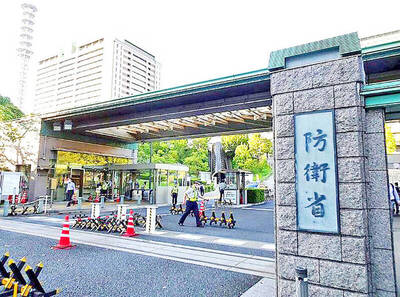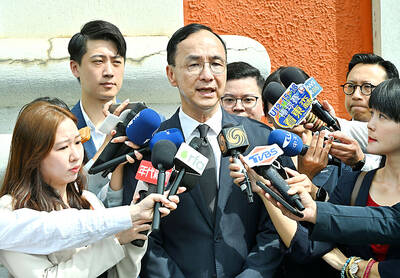Academia Sinica President Lee Yuan-tseh's (
Lee, who received the Nobel Prize for chemistry in 1986, has served as Taiwan's representative at the APEC summit three times due to his prestige and ability to win trust and respect from other countries' leaders.
But the 68-year-old leader of Taiwan's scientific community is having more to say about what society must do next to ensure a sustainable future.
"Taiwanese people have to be thoroughly aware of the importance of energy efficiency. If not, we will see an energy crisis here within two decades," Lee said. "In the past five years, the level of Taiwan's carbon-dioxide emissions has increased."
Lee said energy policies relating to state corporations such as Chinese Petroleum Corp and Taipower should be revised so that an up-to-date perspective can be adopted.
"For example, halting new power-plant projects for the sake of energy conservation ... might be criticized as having a negative economic impact on state corporations," Lee said.
Lee believes that promotion of energy conservation should be a top national priority because it might take a long time before a breakthrough is made in research on renewable energy.
He said that the emphasis placed on sustainable development by the rest of the world has promoted energy-conservation measures, such as efficient heating, cooling and lighting, which saves not only natural resources but also money.
"Industry should be acutely responsive to such global trends, too," he said.
Citing the Chinese Petroleum Corp, whose annual budget is about NT$50 billion, as an example, Lee said if one-tenth of that budget could be used for education, then sustainability could be significantly advanced.
Lee said Taiwan needs to adopt better policies to deal with issues of climate change, such as global warming, which carbon dioxide emissions mainly exacerbate.
"In terms of global warming, the adoption of nuclear-power generation should be the way to go for Taiwan. We have to make the best use of existing nuclear-power plants rather than advance their scheduled dates for decommission," Lee said.
Lee's position is obviously not consistent with the Cabinet's "nuclear-free homeland" policy, which seeks to decommission each of the three nuclear power plants now operating seven years early -- in 2011, 2014 and 2017, respectively. The expected 40-year life of each plant will be shortened to 33 years.
"This is not energy-efficient at all. In addition, the completion of the Fourth Nuclear Power Plant now under construction should be guaranteed. It must also be fully utilized," he said.
Lee said that in the next 30 years, energy consumption must be cut by at least one-fourth to ease the pressure on the planet. To curb carbon-dioxide emissions, he predicted nuclear power plants would become more prevalent in China and Korea.
"Abnormal weather patterns have been observed in many places. In Taiwan, we've experienced heavy rainfalls, typhoons and unexpected droughts in the last few years. It's wrong if we keep ruling out nuclear power plants and rely on electricity converted from fossil fuels," he said.
People must change their ways, too, Lee said. Introducing energy-efficient hybrid vehicles powered by a combination of gas and electricity may become an issue of some urgency.
Lee said that regulations for hybrid vehicles, which have much higher energy efficiency and have significantly lower emissions than traditional cars, should be introduced as soon as possible.
Since the industrial revolution in the 19th century, humans have taken advantage of fossil fuels to replace labor, thus increasing productivity.
"Such practices degrade the planet's biosphere. In the past, humans took what they needed without compromising the planet's capacity to sustain it. But since then, the planet's resources have become limited," he said.
Lee said one phenomenon worrying him was how many developing countries were blindly following the development models used by advanced countries.
"Looking at the recent rapid developments in India, China and other developing countries, we do have to worry about the limit on resources. This is not the way for the planet to go," Lee said. "We are in transition. If we don't come up with wise strategies for using energy, future generations will write our stupidity into their history books," Lee said.

LOOKING NORTH: The base would enhance the military’s awareness of activities in the Bashi Channel, which China Coast Guard ships have been frequenting, an expert said The Philippine Navy on Thursday last week inaugurated a forward operating base in the country’s northern most province of Batanes, which at 185km from Taiwan would be strategically important in a military conflict in the Taiwan Strait. The Philippine Daily Inquirer quoted Northern Luzon Command Commander Lieutenant General Fernyl Buca as saying that the base in Mahatao would bolster the country’s northern defenses and response capabilities. The base is also a response to the “irregular presence this month of armed” of China Coast Guard vessels frequenting the Bashi Channel in the Luzon Strait just south of Taiwan, the paper reported, citing a

A total lunar eclipse, an astronomical event often referred to as a “blood moon,” would be visible to sky watchers in Taiwan starting just before midnight on Sunday night, the Taipei Astronomical Museum said. The phenomenon is also called “blood moon” due to the reddish-orange hue it takes on as the Earth passes directly between the sun and the moon, completely blocking direct sunlight from reaching the lunar surface. The only light is refracted by the Earth’s atmosphere, and its red wavelengths are bent toward the moon, illuminating it in a dramatic crimson light. Describing the event as the most important astronomical phenomenon

ENHANCING DETERRENCE: Stationing the missiles in Kyushu would allow Japan to cover waters near Taiwan and China’s coastal areas without any logistical difficulties Japan is to deploy extended-range anti-ship missiles at a Ground Self-Defense Force base in Kumamoto to bolster its defenses, the Yomiuri Shimbun reported on Saturday. The upgraded Type 12 surface-to-ship missile, with a range of more than 1,000km, would be capable of striking targets in the Taiwan Strait and along China’s coast. Originally limited to a few hundred kilometers, the Type 12 was recently modernized ahead of schedule. Deployment, initially slated for next year, has been accelerated after the upgrade was completed sooner than expected, the newspaper said. Stationing the missiles in Kyushu would allow Japan to cover waters near Taiwan and

The presence of Taiwanese politicians at China’s military parade tomorrow would send the wrong message to Beijing and the international community about Taiwan’s sovereignty and democracy, a national security official said yesterday. China is to hold the parade tomorrow to mark the 80th anniversary of Japan’s surrender in World War II. By bringing together leaders of “anti-West” governments such as Russia, North Korea, Iran and Belarus, the parade aims to project a symbolic image of an alliance that is cohesive and unbending against Western countries, the national security official said, speaking on condition of anonymity. Former Chinese Nationalist Party (KMT) chairwoman Hung Hsiu-chu